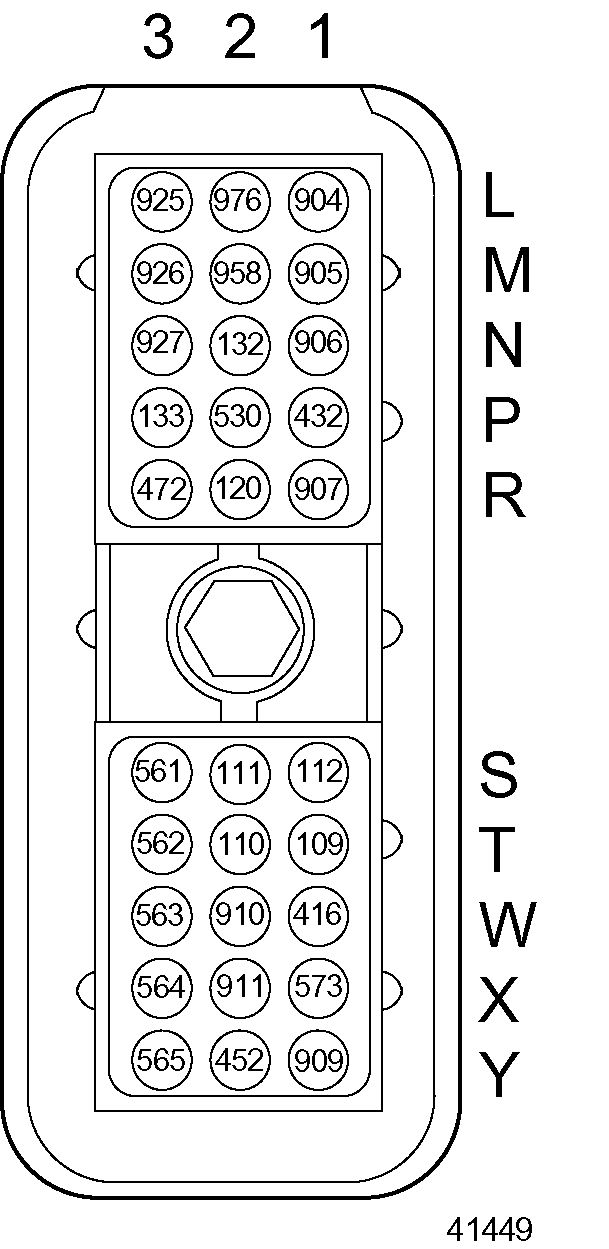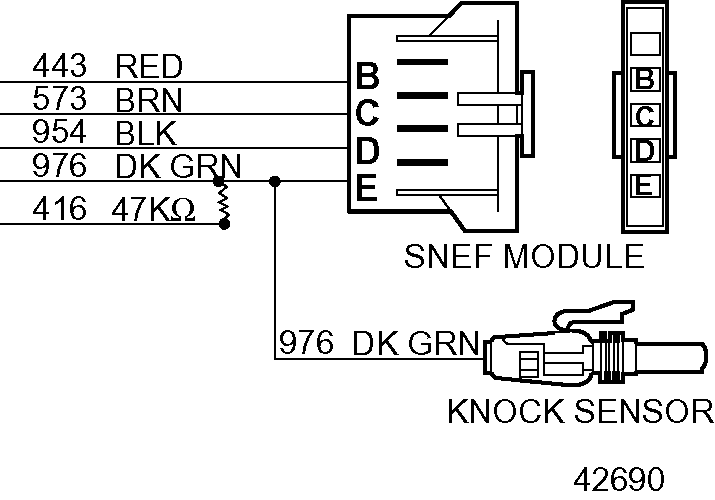Section 6.9
SID 76, FMI 3, Flash Code 66, Engine Knock Level Sensor Input Voltage High
The engine knock level sensor input voltage is above normal range.
Section 6.9.1
Troubleshooting SID 76, FMI 3, Flash Code 66
Troubleshoot as follows:
NOTICE: |
|
To avoid damage to the harness and connectors when disconnecting harness connectors, ensure the pulling force is applied to the connectors and not to the wires extending from the connectors. |
- Check wire 976 (dark green, knock sensor) for continuity at cavity L-2 in the Engine Sensor Harness (ESH) 30–pin connector (see Figure
"Engine Sensor Harness 30–pin Connector"
), pin E in the SNEF module connector, and the knock sensor connector (see Figure
"SNEF Module and Knock Sensor Connectors"
). If there is an open path, repair or replace the wire(s), pins, and sockets.

Figure 1. Engine Sensor Harness 30–pin Connector

Figure 2. SNEF Module and Knock Sensor Connectors
- If code is still active, go to step 2.
- If the code is no longer active, refer to "6.9.2 Verification" .
- Check wire 976 (dark green, knock sensor) for a short to wire 416 (gray, 5 VDC sensor supply) at cavities L-2 (wire 976) and W-1 (wire 416) in the ESH 30–pin connector (see Figure
"Engine Sensor Harness 30–pin Connector"
), pin E in the SNEF module connector, and the knock sensor connector (see Figure
"SNEF Module and Knock Sensor Connectors"
). If there is a short, repair or replace the wire(s), pins, and sockets.
- If code is still active, go to step 3.
- If the code is no longer active, refer to "6.9.2 Verification" .
- Check wire 976 (dark green, knock sensor) for short to wire 443 (red, 12 VDC SNEF power supply) at cavity L-2 in the ESH 30–pin connector (see Figure
"Engine Sensor Harness 30–pin Connector"
), pins B (wire 443) and E (wire 976) in the SNEF module connector, and the knock sensor connector (see Figure
"SNEF Module and Knock Sensor Connectors"
). If there is a short, repair or replace the wire(s), pins, and sockets.
- If code is still active, go to step 4.
- If the code is no longer active, refer to "6.9.2 Verification" .
- Check wire 573 (brown, auxiliary timed input) for continuity at cavity X-1 in the ESH 30–pin connector (see Figure
"Engine Sensor Harness 30–pin Connector"
) and pin C in the SNEF module connector (see Figure
"SNEF Module and Knock Sensor Connectors"
). If there is an open path, repair or replace the wire, pins, and sockets.
- If code is still active, go to step 5.
- If the code is no longer active, refer to "6.9.2 Verification" .
- Check wire 573 (brown, auxiliary timed input) for a short to wire 416 (gray, 5 VDC sensor supply) at cavities X-1 (wire 573) and W-1 (wire 416) in the ESH 30–pin connector (see Figure
"Engine Sensor Harness 30–pin Connector"
) and pin C in the SNEF module connector (see Figure
"SNEF Module and Knock Sensor Connectors"
). If there is a short, repair or replace the wire(s), pins, and sockets.
- If code is still active, go to step 6.
- If the code is no longer active, refer to "6.9.2 Verification" .
- Check wire 573 (brown, auxiliary timed input) for a short to wire 443 (red, 12 VDC SNEF power supply) at cavity X-1 in the ESH 30–pin connector (see Figure
"Engine Sensor Harness 30–pin Connector"
) and pins B (wire 443) and C (wire 573) in the SNEF module connector (see Figure
"SNEF Module and Knock Sensor Connectors"
). If there is a short, repair or replace the wire(s), pins, and sockets.
- If code is still active, call Detroit Diesel Technical Service.
- If the code is no longer active, refer to "6.9.2 Verification" .
Section 6.9.2
Verification
Verify that troubleshooting was successful:
- Check the DDR to see if SID 76, FMI 3, Flash Code 66 is still active.
- If the code is still active, go to step 2.
- If the code is not active, troubleshooting is complete.
- If code is still active, call Detroit Diesel Technical Service.
| Series 50G and 60G Troubleshooting Guide - 6SE482 |
| Generated on 10-13-2008 |